Impact of Gender and Ethnicity on Transition to Adulthood
VerifiedAdded on 2023/04/05
|8
|2176
|263
Essay
AI Summary
This essay examines the significant roles gender and ethnicity play in shaping an individual's transition to adulthood. It references Coleman's work and the Wisconsin study, highlighting how social, psychological, and institutional factors, along with socioeconomic origins, affect this critical period. The essay discusses how Western societies' emphasis on women's rights and equality impacts women's choices regarding career, family, and education. It further explores how gender biases in education and societal stereotypes influence young people's expectations and career paths, with policies sometimes inadvertently favoring young men. The role of ethnicity, interwoven with race, religion, and culture, adds another layer of complexity, often leading to prejudices that affect career choices. Ultimately, the essay concludes that gender and ethnicity remain crucial markers in the sociological study of the transition to adulthood.
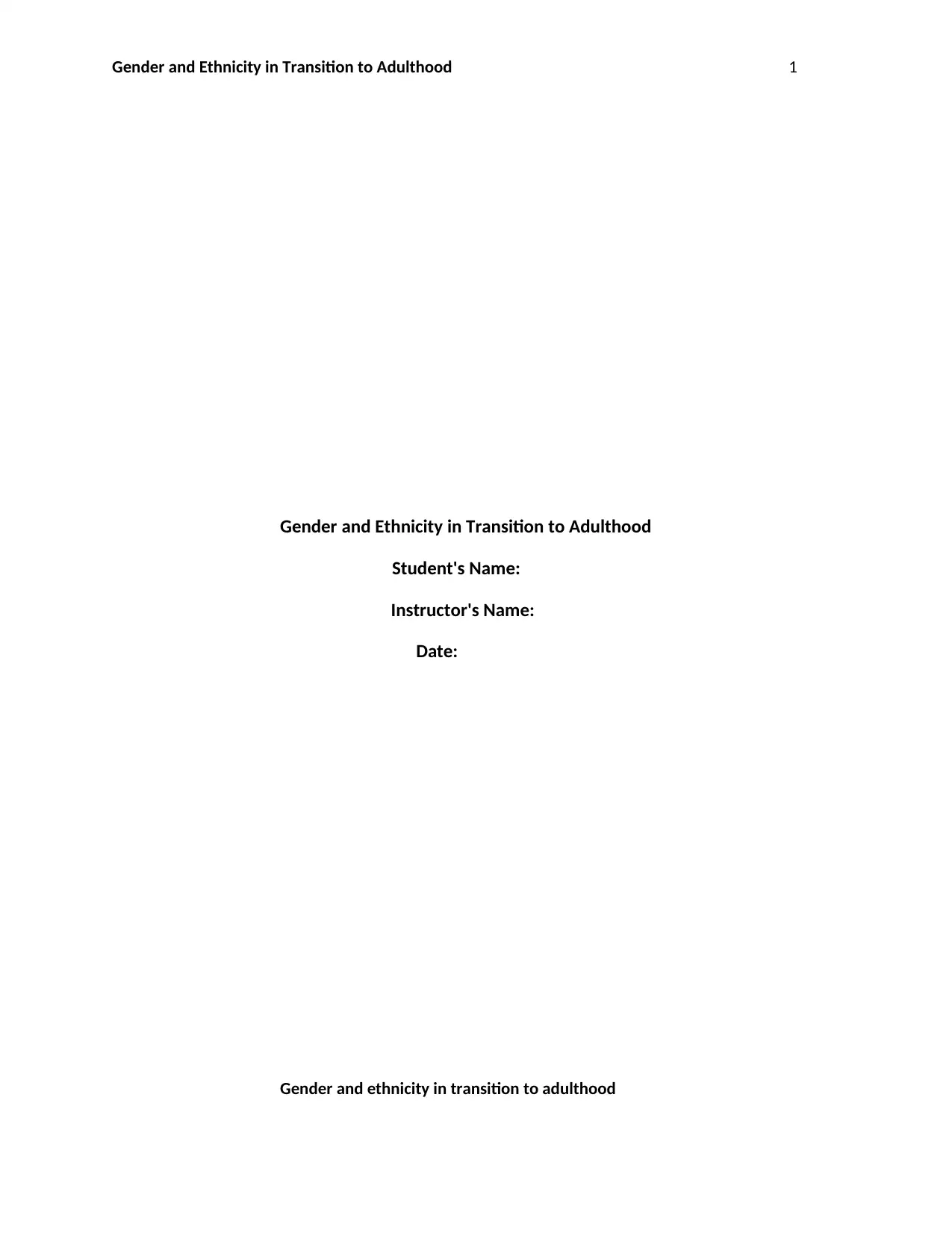
Gender and Ethnicity in Transition to Adulthood 1
Gender and Ethnicity in Transition to Adulthood
Student's Name:
Instructor's Name:
Date:
Gender and ethnicity in transition to adulthood
Gender and Ethnicity in Transition to Adulthood
Student's Name:
Instructor's Name:
Date:
Gender and ethnicity in transition to adulthood
Paraphrase This Document
Need a fresh take? Get an instant paraphrase of this document with our AI Paraphraser
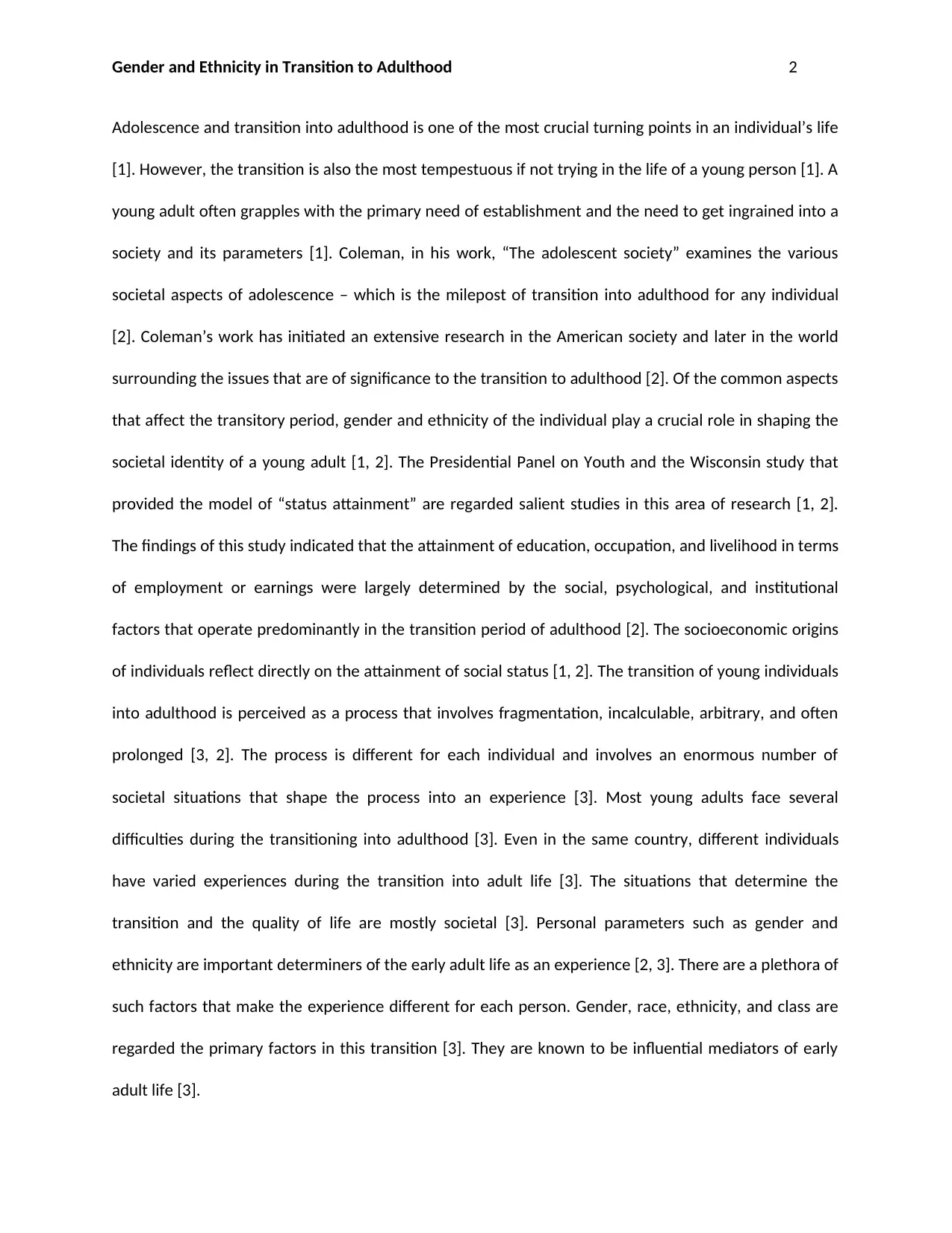
Gender and Ethnicity in Transition to Adulthood 2
Adolescence and transition into adulthood is one of the most crucial turning points in an individual’s life
[1]. However, the transition is also the most tempestuous if not trying in the life of a young person [1]. A
young adult often grapples with the primary need of establishment and the need to get ingrained into a
society and its parameters [1]. Coleman, in his work, “The adolescent society” examines the various
societal aspects of adolescence – which is the milepost of transition into adulthood for any individual
[2]. Coleman’s work has initiated an extensive research in the American society and later in the world
surrounding the issues that are of significance to the transition to adulthood [2]. Of the common aspects
that affect the transitory period, gender and ethnicity of the individual play a crucial role in shaping the
societal identity of a young adult [1, 2]. The Presidential Panel on Youth and the Wisconsin study that
provided the model of “status attainment” are regarded salient studies in this area of research [1, 2].
The findings of this study indicated that the attainment of education, occupation, and livelihood in terms
of employment or earnings were largely determined by the social, psychological, and institutional
factors that operate predominantly in the transition period of adulthood [2]. The socioeconomic origins
of individuals reflect directly on the attainment of social status [1, 2]. The transition of young individuals
into adulthood is perceived as a process that involves fragmentation, incalculable, arbitrary, and often
prolonged [3, 2]. The process is different for each individual and involves an enormous number of
societal situations that shape the process into an experience [3]. Most young adults face several
difficulties during the transitioning into adulthood [3]. Even in the same country, different individuals
have varied experiences during the transition into adult life [3]. The situations that determine the
transition and the quality of life are mostly societal [3]. Personal parameters such as gender and
ethnicity are important determiners of the early adult life as an experience [2, 3]. There are a plethora of
such factors that make the experience different for each person. Gender, race, ethnicity, and class are
regarded the primary factors in this transition [3]. They are known to be influential mediators of early
adult life [3].
Adolescence and transition into adulthood is one of the most crucial turning points in an individual’s life
[1]. However, the transition is also the most tempestuous if not trying in the life of a young person [1]. A
young adult often grapples with the primary need of establishment and the need to get ingrained into a
society and its parameters [1]. Coleman, in his work, “The adolescent society” examines the various
societal aspects of adolescence – which is the milepost of transition into adulthood for any individual
[2]. Coleman’s work has initiated an extensive research in the American society and later in the world
surrounding the issues that are of significance to the transition to adulthood [2]. Of the common aspects
that affect the transitory period, gender and ethnicity of the individual play a crucial role in shaping the
societal identity of a young adult [1, 2]. The Presidential Panel on Youth and the Wisconsin study that
provided the model of “status attainment” are regarded salient studies in this area of research [1, 2].
The findings of this study indicated that the attainment of education, occupation, and livelihood in terms
of employment or earnings were largely determined by the social, psychological, and institutional
factors that operate predominantly in the transition period of adulthood [2]. The socioeconomic origins
of individuals reflect directly on the attainment of social status [1, 2]. The transition of young individuals
into adulthood is perceived as a process that involves fragmentation, incalculable, arbitrary, and often
prolonged [3, 2]. The process is different for each individual and involves an enormous number of
societal situations that shape the process into an experience [3]. Most young adults face several
difficulties during the transitioning into adulthood [3]. Even in the same country, different individuals
have varied experiences during the transition into adult life [3]. The situations that determine the
transition and the quality of life are mostly societal [3]. Personal parameters such as gender and
ethnicity are important determiners of the early adult life as an experience [2, 3]. There are a plethora of
such factors that make the experience different for each person. Gender, race, ethnicity, and class are
regarded the primary factors in this transition [3]. They are known to be influential mediators of early
adult life [3].
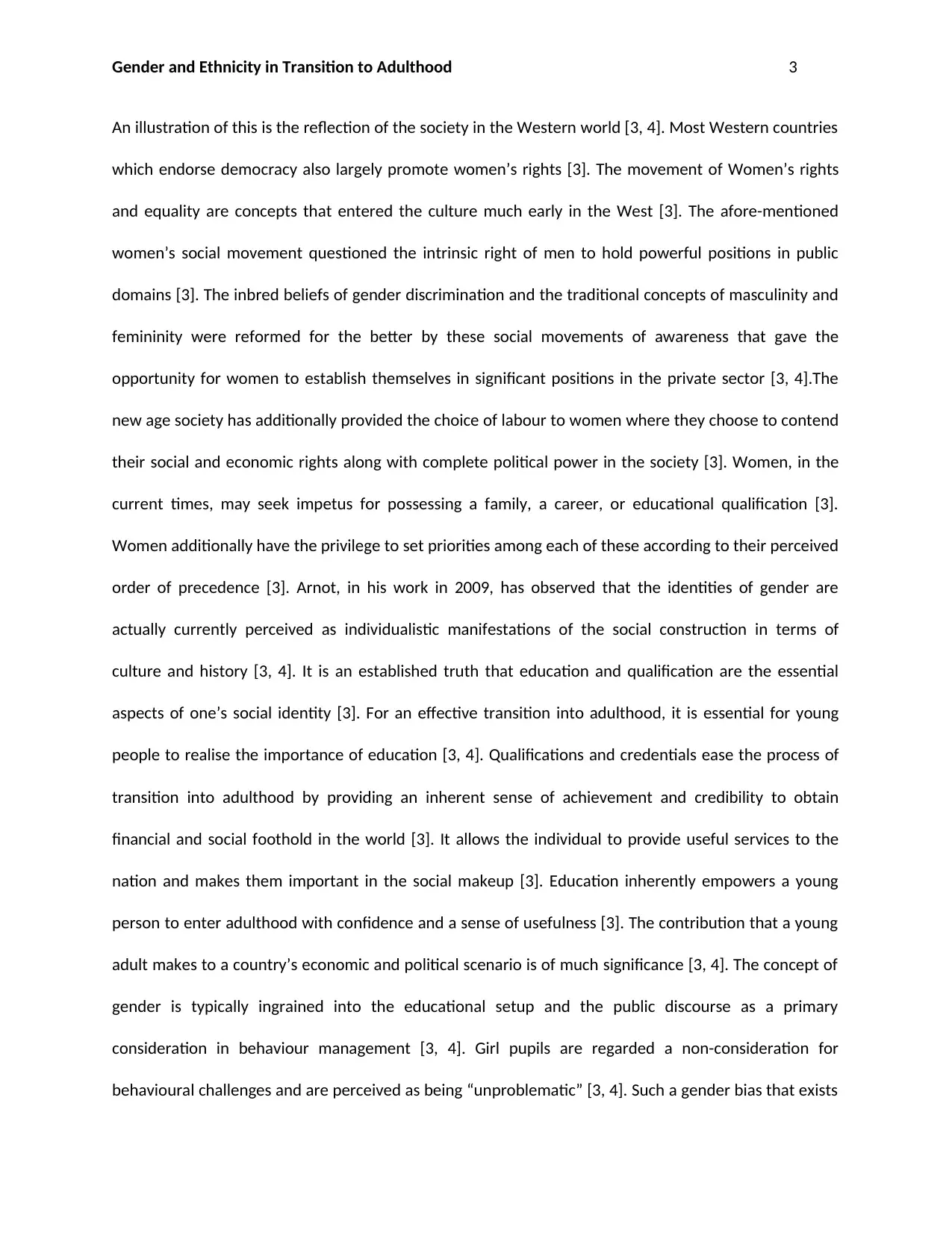
Gender and Ethnicity in Transition to Adulthood 3
An illustration of this is the reflection of the society in the Western world [3, 4]. Most Western countries
which endorse democracy also largely promote women’s rights [3]. The movement of Women’s rights
and equality are concepts that entered the culture much early in the West [3]. The afore-mentioned
women’s social movement questioned the intrinsic right of men to hold powerful positions in public
domains [3]. The inbred beliefs of gender discrimination and the traditional concepts of masculinity and
femininity were reformed for the better by these social movements of awareness that gave the
opportunity for women to establish themselves in significant positions in the private sector [3, 4].The
new age society has additionally provided the choice of labour to women where they choose to contend
their social and economic rights along with complete political power in the society [3]. Women, in the
current times, may seek impetus for possessing a family, a career, or educational qualification [3].
Women additionally have the privilege to set priorities among each of these according to their perceived
order of precedence [3]. Arnot, in his work in 2009, has observed that the identities of gender are
actually currently perceived as individualistic manifestations of the social construction in terms of
culture and history [3, 4]. It is an established truth that education and qualification are the essential
aspects of one’s social identity [3]. For an effective transition into adulthood, it is essential for young
people to realise the importance of education [3, 4]. Qualifications and credentials ease the process of
transition into adulthood by providing an inherent sense of achievement and credibility to obtain
financial and social foothold in the world [3]. It allows the individual to provide useful services to the
nation and makes them important in the social makeup [3]. Education inherently empowers a young
person to enter adulthood with confidence and a sense of usefulness [3]. The contribution that a young
adult makes to a country’s economic and political scenario is of much significance [3, 4]. The concept of
gender is typically ingrained into the educational setup and the public discourse as a primary
consideration in behaviour management [3, 4]. Girl pupils are regarded a non-consideration for
behavioural challenges and are perceived as being “unproblematic” [3, 4]. Such a gender bias that exists
An illustration of this is the reflection of the society in the Western world [3, 4]. Most Western countries
which endorse democracy also largely promote women’s rights [3]. The movement of Women’s rights
and equality are concepts that entered the culture much early in the West [3]. The afore-mentioned
women’s social movement questioned the intrinsic right of men to hold powerful positions in public
domains [3]. The inbred beliefs of gender discrimination and the traditional concepts of masculinity and
femininity were reformed for the better by these social movements of awareness that gave the
opportunity for women to establish themselves in significant positions in the private sector [3, 4].The
new age society has additionally provided the choice of labour to women where they choose to contend
their social and economic rights along with complete political power in the society [3]. Women, in the
current times, may seek impetus for possessing a family, a career, or educational qualification [3].
Women additionally have the privilege to set priorities among each of these according to their perceived
order of precedence [3]. Arnot, in his work in 2009, has observed that the identities of gender are
actually currently perceived as individualistic manifestations of the social construction in terms of
culture and history [3, 4]. It is an established truth that education and qualification are the essential
aspects of one’s social identity [3]. For an effective transition into adulthood, it is essential for young
people to realise the importance of education [3, 4]. Qualifications and credentials ease the process of
transition into adulthood by providing an inherent sense of achievement and credibility to obtain
financial and social foothold in the world [3]. It allows the individual to provide useful services to the
nation and makes them important in the social makeup [3]. Education inherently empowers a young
person to enter adulthood with confidence and a sense of usefulness [3]. The contribution that a young
adult makes to a country’s economic and political scenario is of much significance [3, 4]. The concept of
gender is typically ingrained into the educational setup and the public discourse as a primary
consideration in behaviour management [3, 4]. Girl pupils are regarded a non-consideration for
behavioural challenges and are perceived as being “unproblematic” [3, 4]. Such a gender bias that exists
⊘ This is a preview!⊘
Do you want full access?
Subscribe today to unlock all pages.

Trusted by 1+ million students worldwide
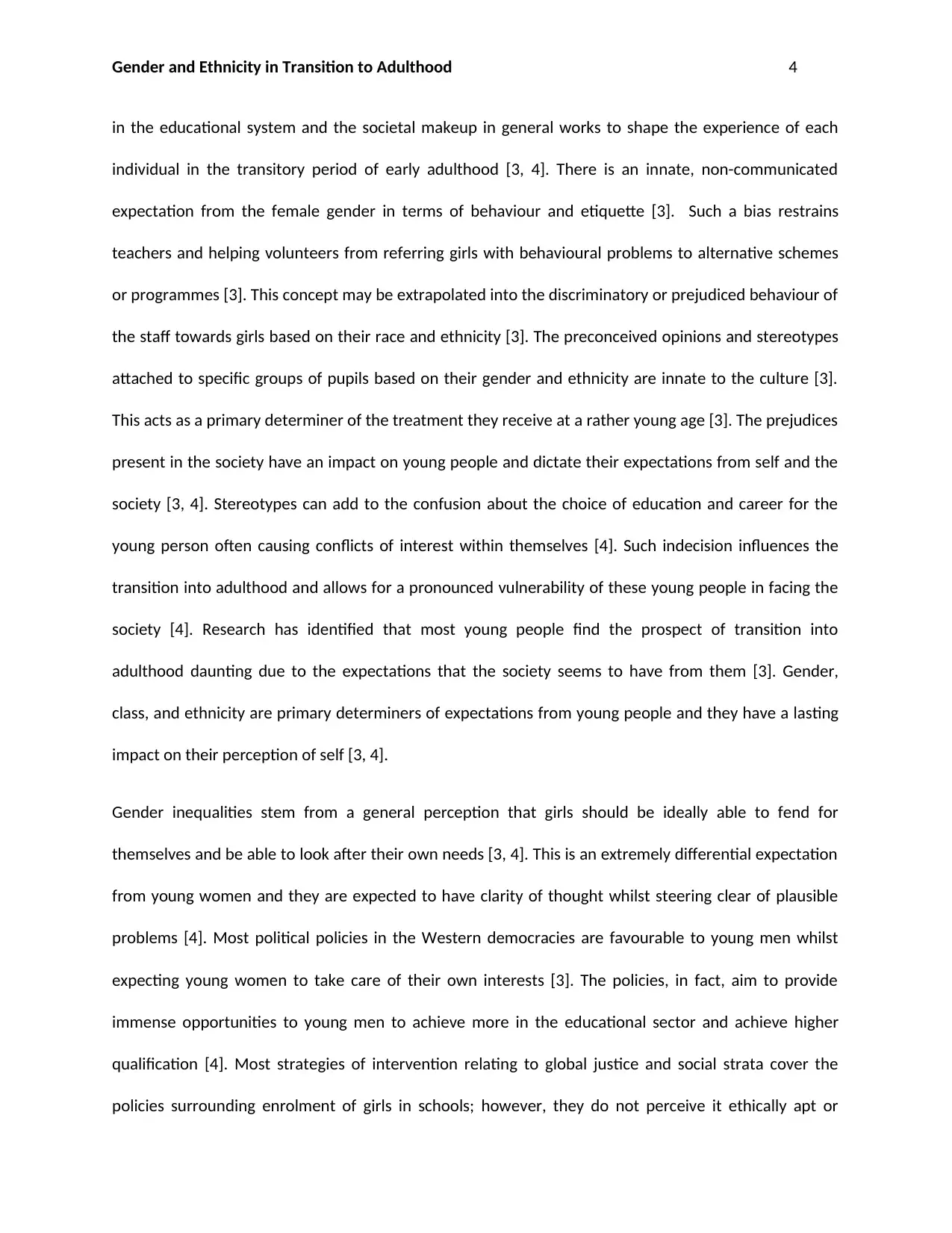
Gender and Ethnicity in Transition to Adulthood 4
in the educational system and the societal makeup in general works to shape the experience of each
individual in the transitory period of early adulthood [3, 4]. There is an innate, non-communicated
expectation from the female gender in terms of behaviour and etiquette [3]. Such a bias restrains
teachers and helping volunteers from referring girls with behavioural problems to alternative schemes
or programmes [3]. This concept may be extrapolated into the discriminatory or prejudiced behaviour of
the staff towards girls based on their race and ethnicity [3]. The preconceived opinions and stereotypes
attached to specific groups of pupils based on their gender and ethnicity are innate to the culture [3].
This acts as a primary determiner of the treatment they receive at a rather young age [3]. The prejudices
present in the society have an impact on young people and dictate their expectations from self and the
society [3, 4]. Stereotypes can add to the confusion about the choice of education and career for the
young person often causing conflicts of interest within themselves [4]. Such indecision influences the
transition into adulthood and allows for a pronounced vulnerability of these young people in facing the
society [4]. Research has identified that most young people find the prospect of transition into
adulthood daunting due to the expectations that the society seems to have from them [3]. Gender,
class, and ethnicity are primary determiners of expectations from young people and they have a lasting
impact on their perception of self [3, 4].
Gender inequalities stem from a general perception that girls should be ideally able to fend for
themselves and be able to look after their own needs [3, 4]. This is an extremely differential expectation
from young women and they are expected to have clarity of thought whilst steering clear of plausible
problems [4]. Most political policies in the Western democracies are favourable to young men whilst
expecting young women to take care of their own interests [3]. The policies, in fact, aim to provide
immense opportunities to young men to achieve more in the educational sector and achieve higher
qualification [4]. Most strategies of intervention relating to global justice and social strata cover the
policies surrounding enrolment of girls in schools; however, they do not perceive it ethically apt or
in the educational system and the societal makeup in general works to shape the experience of each
individual in the transitory period of early adulthood [3, 4]. There is an innate, non-communicated
expectation from the female gender in terms of behaviour and etiquette [3]. Such a bias restrains
teachers and helping volunteers from referring girls with behavioural problems to alternative schemes
or programmes [3]. This concept may be extrapolated into the discriminatory or prejudiced behaviour of
the staff towards girls based on their race and ethnicity [3]. The preconceived opinions and stereotypes
attached to specific groups of pupils based on their gender and ethnicity are innate to the culture [3].
This acts as a primary determiner of the treatment they receive at a rather young age [3]. The prejudices
present in the society have an impact on young people and dictate their expectations from self and the
society [3, 4]. Stereotypes can add to the confusion about the choice of education and career for the
young person often causing conflicts of interest within themselves [4]. Such indecision influences the
transition into adulthood and allows for a pronounced vulnerability of these young people in facing the
society [4]. Research has identified that most young people find the prospect of transition into
adulthood daunting due to the expectations that the society seems to have from them [3]. Gender,
class, and ethnicity are primary determiners of expectations from young people and they have a lasting
impact on their perception of self [3, 4].
Gender inequalities stem from a general perception that girls should be ideally able to fend for
themselves and be able to look after their own needs [3, 4]. This is an extremely differential expectation
from young women and they are expected to have clarity of thought whilst steering clear of plausible
problems [4]. Most political policies in the Western democracies are favourable to young men whilst
expecting young women to take care of their own interests [3]. The policies, in fact, aim to provide
immense opportunities to young men to achieve more in the educational sector and achieve higher
qualification [4]. Most strategies of intervention relating to global justice and social strata cover the
policies surrounding enrolment of girls in schools; however, they do not perceive it ethically apt or
Paraphrase This Document
Need a fresh take? Get an instant paraphrase of this document with our AI Paraphraser
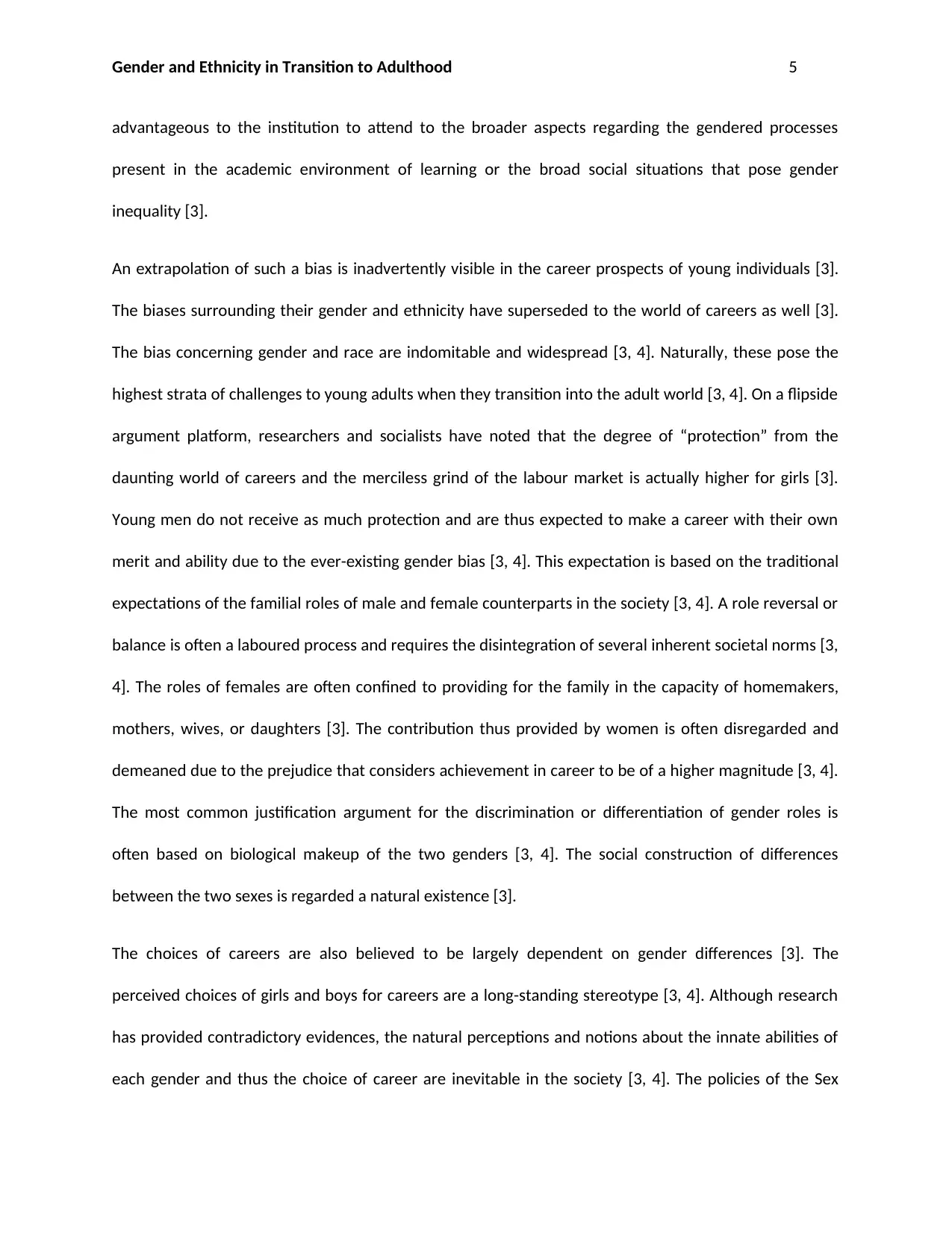
Gender and Ethnicity in Transition to Adulthood 5
advantageous to the institution to attend to the broader aspects regarding the gendered processes
present in the academic environment of learning or the broad social situations that pose gender
inequality [3].
An extrapolation of such a bias is inadvertently visible in the career prospects of young individuals [3].
The biases surrounding their gender and ethnicity have superseded to the world of careers as well [3].
The bias concerning gender and race are indomitable and widespread [3, 4]. Naturally, these pose the
highest strata of challenges to young adults when they transition into the adult world [3, 4]. On a flipside
argument platform, researchers and socialists have noted that the degree of “protection” from the
daunting world of careers and the merciless grind of the labour market is actually higher for girls [3].
Young men do not receive as much protection and are thus expected to make a career with their own
merit and ability due to the ever-existing gender bias [3, 4]. This expectation is based on the traditional
expectations of the familial roles of male and female counterparts in the society [3, 4]. A role reversal or
balance is often a laboured process and requires the disintegration of several inherent societal norms [3,
4]. The roles of females are often confined to providing for the family in the capacity of homemakers,
mothers, wives, or daughters [3]. The contribution thus provided by women is often disregarded and
demeaned due to the prejudice that considers achievement in career to be of a higher magnitude [3, 4].
The most common justification argument for the discrimination or differentiation of gender roles is
often based on biological makeup of the two genders [3, 4]. The social construction of differences
between the two sexes is regarded a natural existence [3].
The choices of careers are also believed to be largely dependent on gender differences [3]. The
perceived choices of girls and boys for careers are a long-standing stereotype [3, 4]. Although research
has provided contradictory evidences, the natural perceptions and notions about the innate abilities of
each gender and thus the choice of career are inevitable in the society [3, 4]. The policies of the Sex
advantageous to the institution to attend to the broader aspects regarding the gendered processes
present in the academic environment of learning or the broad social situations that pose gender
inequality [3].
An extrapolation of such a bias is inadvertently visible in the career prospects of young individuals [3].
The biases surrounding their gender and ethnicity have superseded to the world of careers as well [3].
The bias concerning gender and race are indomitable and widespread [3, 4]. Naturally, these pose the
highest strata of challenges to young adults when they transition into the adult world [3, 4]. On a flipside
argument platform, researchers and socialists have noted that the degree of “protection” from the
daunting world of careers and the merciless grind of the labour market is actually higher for girls [3].
Young men do not receive as much protection and are thus expected to make a career with their own
merit and ability due to the ever-existing gender bias [3, 4]. This expectation is based on the traditional
expectations of the familial roles of male and female counterparts in the society [3, 4]. A role reversal or
balance is often a laboured process and requires the disintegration of several inherent societal norms [3,
4]. The roles of females are often confined to providing for the family in the capacity of homemakers,
mothers, wives, or daughters [3]. The contribution thus provided by women is often disregarded and
demeaned due to the prejudice that considers achievement in career to be of a higher magnitude [3, 4].
The most common justification argument for the discrimination or differentiation of gender roles is
often based on biological makeup of the two genders [3, 4]. The social construction of differences
between the two sexes is regarded a natural existence [3].
The choices of careers are also believed to be largely dependent on gender differences [3]. The
perceived choices of girls and boys for careers are a long-standing stereotype [3, 4]. Although research
has provided contradictory evidences, the natural perceptions and notions about the innate abilities of
each gender and thus the choice of career are inevitable in the society [3, 4]. The policies of the Sex
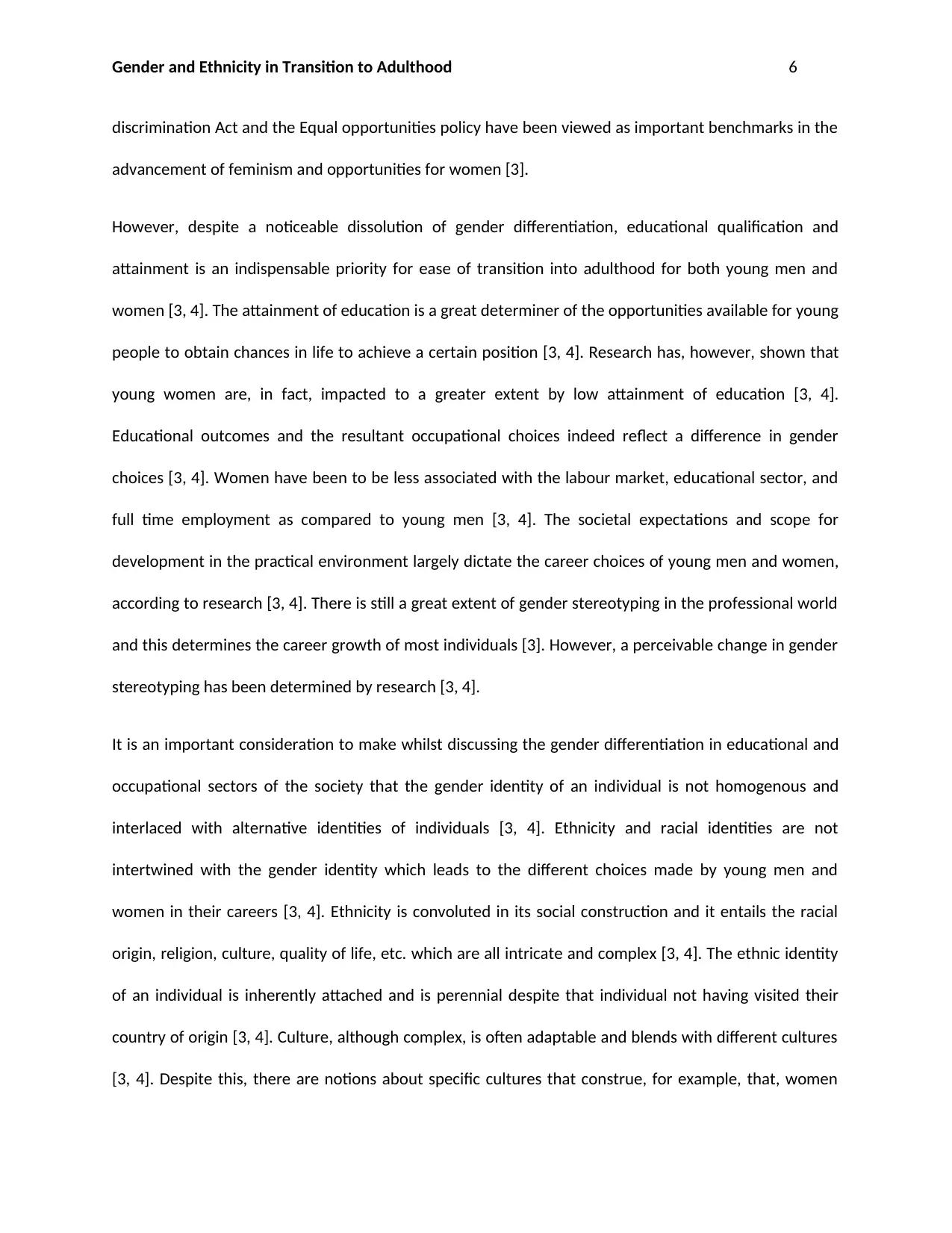
Gender and Ethnicity in Transition to Adulthood 6
discrimination Act and the Equal opportunities policy have been viewed as important benchmarks in the
advancement of feminism and opportunities for women [3].
However, despite a noticeable dissolution of gender differentiation, educational qualification and
attainment is an indispensable priority for ease of transition into adulthood for both young men and
women [3, 4]. The attainment of education is a great determiner of the opportunities available for young
people to obtain chances in life to achieve a certain position [3, 4]. Research has, however, shown that
young women are, in fact, impacted to a greater extent by low attainment of education [3, 4].
Educational outcomes and the resultant occupational choices indeed reflect a difference in gender
choices [3, 4]. Women have been to be less associated with the labour market, educational sector, and
full time employment as compared to young men [3, 4]. The societal expectations and scope for
development in the practical environment largely dictate the career choices of young men and women,
according to research [3, 4]. There is still a great extent of gender stereotyping in the professional world
and this determines the career growth of most individuals [3]. However, a perceivable change in gender
stereotyping has been determined by research [3, 4].
It is an important consideration to make whilst discussing the gender differentiation in educational and
occupational sectors of the society that the gender identity of an individual is not homogenous and
interlaced with alternative identities of individuals [3, 4]. Ethnicity and racial identities are not
intertwined with the gender identity which leads to the different choices made by young men and
women in their careers [3, 4]. Ethnicity is convoluted in its social construction and it entails the racial
origin, religion, culture, quality of life, etc. which are all intricate and complex [3, 4]. The ethnic identity
of an individual is inherently attached and is perennial despite that individual not having visited their
country of origin [3, 4]. Culture, although complex, is often adaptable and blends with different cultures
[3, 4]. Despite this, there are notions about specific cultures that construe, for example, that, women
discrimination Act and the Equal opportunities policy have been viewed as important benchmarks in the
advancement of feminism and opportunities for women [3].
However, despite a noticeable dissolution of gender differentiation, educational qualification and
attainment is an indispensable priority for ease of transition into adulthood for both young men and
women [3, 4]. The attainment of education is a great determiner of the opportunities available for young
people to obtain chances in life to achieve a certain position [3, 4]. Research has, however, shown that
young women are, in fact, impacted to a greater extent by low attainment of education [3, 4].
Educational outcomes and the resultant occupational choices indeed reflect a difference in gender
choices [3, 4]. Women have been to be less associated with the labour market, educational sector, and
full time employment as compared to young men [3, 4]. The societal expectations and scope for
development in the practical environment largely dictate the career choices of young men and women,
according to research [3, 4]. There is still a great extent of gender stereotyping in the professional world
and this determines the career growth of most individuals [3]. However, a perceivable change in gender
stereotyping has been determined by research [3, 4].
It is an important consideration to make whilst discussing the gender differentiation in educational and
occupational sectors of the society that the gender identity of an individual is not homogenous and
interlaced with alternative identities of individuals [3, 4]. Ethnicity and racial identities are not
intertwined with the gender identity which leads to the different choices made by young men and
women in their careers [3, 4]. Ethnicity is convoluted in its social construction and it entails the racial
origin, religion, culture, quality of life, etc. which are all intricate and complex [3, 4]. The ethnic identity
of an individual is inherently attached and is perennial despite that individual not having visited their
country of origin [3, 4]. Culture, although complex, is often adaptable and blends with different cultures
[3, 4]. Despite this, there are notions about specific cultures that construe, for example, that, women
⊘ This is a preview!⊘
Do you want full access?
Subscribe today to unlock all pages.

Trusted by 1+ million students worldwide
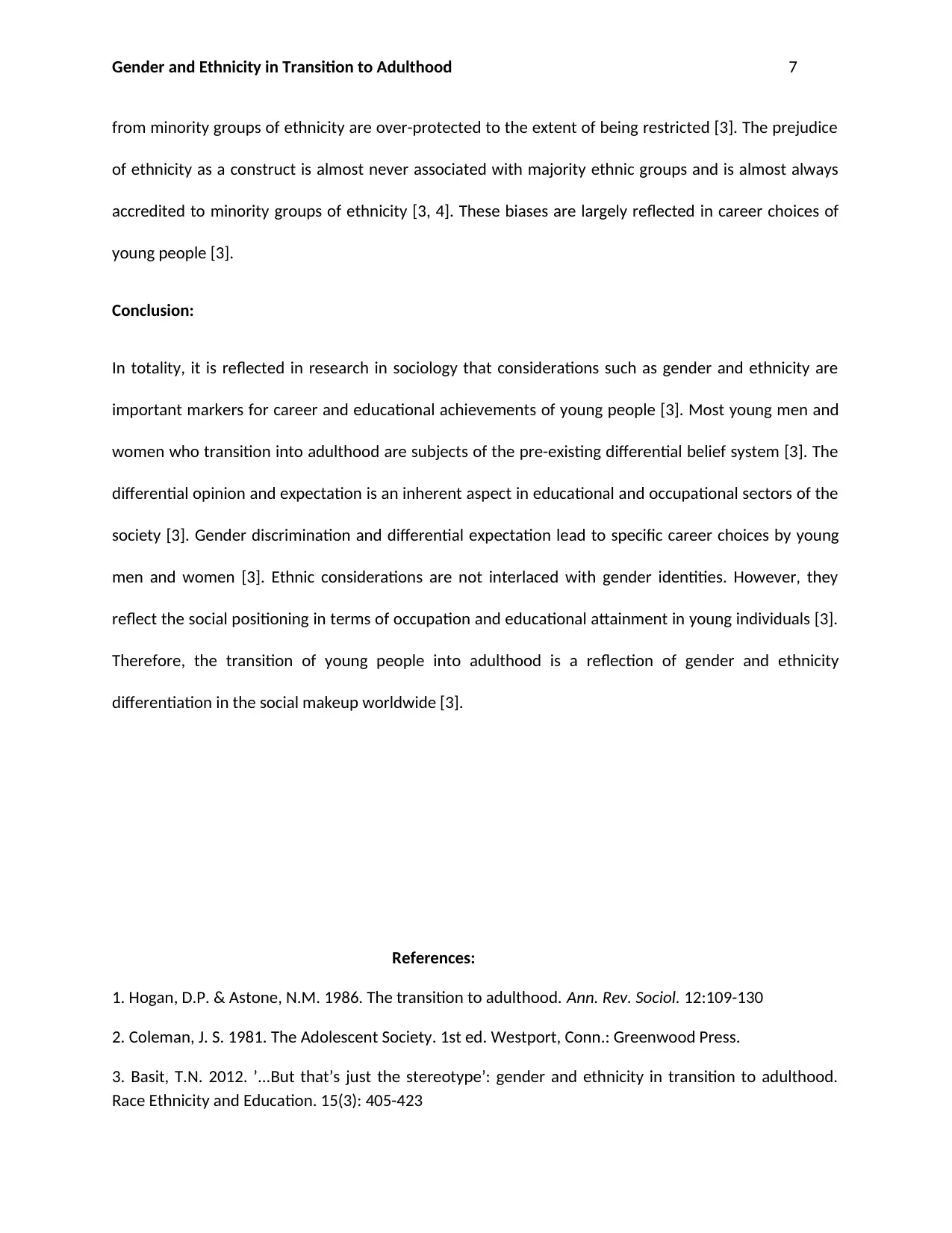
Gender and Ethnicity in Transition to Adulthood 7
from minority groups of ethnicity are over-protected to the extent of being restricted [3]. The prejudice
of ethnicity as a construct is almost never associated with majority ethnic groups and is almost always
accredited to minority groups of ethnicity [3, 4]. These biases are largely reflected in career choices of
young people [3].
Conclusion:
In totality, it is reflected in research in sociology that considerations such as gender and ethnicity are
important markers for career and educational achievements of young people [3]. Most young men and
women who transition into adulthood are subjects of the pre-existing differential belief system [3]. The
differential opinion and expectation is an inherent aspect in educational and occupational sectors of the
society [3]. Gender discrimination and differential expectation lead to specific career choices by young
men and women [3]. Ethnic considerations are not interlaced with gender identities. However, they
reflect the social positioning in terms of occupation and educational attainment in young individuals [3].
Therefore, the transition of young people into adulthood is a reflection of gender and ethnicity
differentiation in the social makeup worldwide [3].
References:
1. Hogan, D.P. & Astone, N.M. 1986. The transition to adulthood. Ann. Rev. Sociol. 12:109-130
2. Coleman, J. S. 1981. The Adolescent Society. 1st ed. Westport, Conn.: Greenwood Press.
3. Basit, T.N. 2012. ’...But that’s just the stereotype’: gender and ethnicity in transition to adulthood.
Race Ethnicity and Education. 15(3): 405-423
from minority groups of ethnicity are over-protected to the extent of being restricted [3]. The prejudice
of ethnicity as a construct is almost never associated with majority ethnic groups and is almost always
accredited to minority groups of ethnicity [3, 4]. These biases are largely reflected in career choices of
young people [3].
Conclusion:
In totality, it is reflected in research in sociology that considerations such as gender and ethnicity are
important markers for career and educational achievements of young people [3]. Most young men and
women who transition into adulthood are subjects of the pre-existing differential belief system [3]. The
differential opinion and expectation is an inherent aspect in educational and occupational sectors of the
society [3]. Gender discrimination and differential expectation lead to specific career choices by young
men and women [3]. Ethnic considerations are not interlaced with gender identities. However, they
reflect the social positioning in terms of occupation and educational attainment in young individuals [3].
Therefore, the transition of young people into adulthood is a reflection of gender and ethnicity
differentiation in the social makeup worldwide [3].
References:
1. Hogan, D.P. & Astone, N.M. 1986. The transition to adulthood. Ann. Rev. Sociol. 12:109-130
2. Coleman, J. S. 1981. The Adolescent Society. 1st ed. Westport, Conn.: Greenwood Press.
3. Basit, T.N. 2012. ’...But that’s just the stereotype’: gender and ethnicity in transition to adulthood.
Race Ethnicity and Education. 15(3): 405-423
Paraphrase This Document
Need a fresh take? Get an instant paraphrase of this document with our AI Paraphraser

Gender and Ethnicity in Transition to Adulthood 8
4. Arnot, M. 2009. Educating the gendered citizen. Abingdon:Routledge
4. Arnot, M. 2009. Educating the gendered citizen. Abingdon:Routledge
1 out of 8
Related Documents
Your All-in-One AI-Powered Toolkit for Academic Success.
+13062052269
info@desklib.com
Available 24*7 on WhatsApp / Email
![[object Object]](/_next/static/media/star-bottom.7253800d.svg)
Unlock your academic potential
Copyright © 2020–2026 A2Z Services. All Rights Reserved. Developed and managed by ZUCOL.





